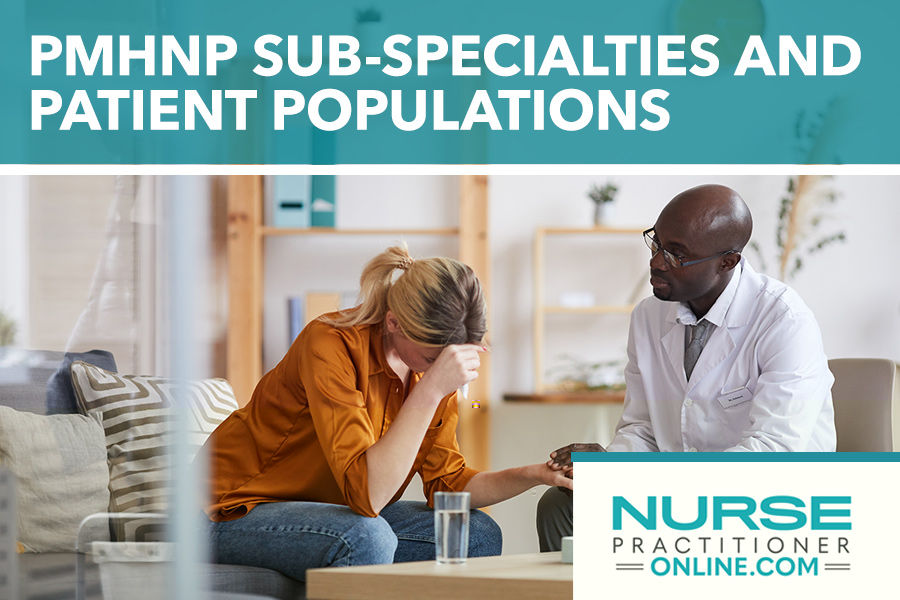Psychiatric Mental Health Nurse Practitioners (PMHNPs) play a crucial role in addressing the growing mental health needs across diverse populations. While the PMHNP degree provides a broad foundation, many practitioners develop specialized expertise with specific patient populations or mental health conditions. This specialization allows for a more profound impact in areas of personal interest and creates opportunities to work with populations that particularly resonate with your professional goals.
This article explores the various PMHNP sub-specialties, patient populations, and educational considerations to help you prepare for your desired career path. Whether you’re a nursing student considering psychiatric specialization or a practicing nurse planning your next career move, understanding these options can help you make informed decisions about your professional journey.
Learn more about how to become a psychiatric-mental health nurse practitioner.
Child and Adolescent Psychiatry
Patient Population Focus
PMHNPs specializing in child and adolescent psychiatry work with patients from early childhood through adolescence. They address conditions including attention-deficit/hyperactivity disorder (ADHD), autism spectrum disorders, anxiety, depression, behavioral problems, and early-onset psychotic disorders. This specialty requires understanding developmental stages and how mental health issues uniquely manifest in younger populations.
Educational Considerations
To prepare for this subspecialty:
- Take electives in developmental psychology and child/adolescent psychopathology
- Seek clinical rotations in pediatric mental health settings, schools, and adolescent programs
- Consider additional certifications in play therapy or trauma-informed care for children
- Study family systems therapy approaches, as treatment typically involves significant family engagement
- Focus coursework on psychopharmacology specific to developing brains and bodies
Practitioners in this field often pursue post-graduate certificates in child and adolescent psychiatry after completing their PMHNP program.
Geriatric Psychiatry
Patient Population Focus
Geriatric psychiatric specialists work with older adults managing dementia, depression, anxiety, sleep disorders, and the complex interaction between physical health conditions and mental wellbeing. As the population ages, demand for PMHNPs with expertise in geriatric care continues to grow rapidly.
Educational Considerations
To prepare for geriatric psychiatric practice:
- Select electives in gerontology, neuropsychiatry, and cognitive assessment
- Pursue clinical placements in long-term care facilities, memory care units, and geriatric psychiatric settings
- Study the interaction between multiple medication regimens common in older adults
- Focus on coursework addressing cognitive disorders and end-of-life care issues
- Learn about elder abuse recognition and intervention strategies
Many programs offer specialized tracks or certificates in geriatric mental health that can enhance your preparation for this population.
Substance Use Disorders Treatment
Patient Population Focus
PMHNPs specializing in substance use disorders work with patients struggling with alcohol, opioid, stimulant, and other substance dependencies. This role involves medication-assisted treatment, co-occurring disorder management, and supporting patients through recovery and relapse prevention.
Educational Considerations
To prepare for addiction practice:
- Select electives in addiction medicine and substance use disorder treatment modalities
- Seek clinical rotations in detoxification units, rehabilitation centers, and medication-assisted treatment programs
- Pursue additional training in motivational interviewing and cognitive-behavioral therapy for addiction
- Study psychopharmacology specific to withdrawal management and recovery support
- Focus on co-occurring disorders, as many patients have both substance use and other psychiatric conditions
Some programs offer specialized certificates in addiction psychiatry that can be completed during or after your PMHNP education.
Forensic Psychiatry
Patient Population Focus
Forensic psychiatric practice involves working with individuals in the criminal justice system, conducting competency evaluations, providing treatment in correctional settings, and supporting rehabilitation. This subspecialty bridges the gap between mental health care and legal proceedings.
Educational Considerations
To prepare for forensic psychiatric practice:
- Take electives in forensic psychology, criminology, and legal aspects of mental health care
- Seek clinical experiences in correctional facilities, court clinics, or forensic hospitals
- Study risk assessment and violence prevention strategies
- Focus coursework on personality disorders and impulse control conditions common in this population
- Learn about the legal and ethical complexities of providing care in restrictive environments
Post-graduate certificates or fellowships in forensic psychiatry can provide specialized training beyond the standard PMHNP curriculum.
Crisis Intervention and Trauma Care
Patient Population Focus
PMHNPs specializing in crisis and trauma work with patients experiencing acute psychiatric emergencies, PTSD, and other trauma-related conditions. They may work in emergency departments, crisis response teams, disaster relief efforts, or with specific populations like veterans or survivors of abuse.
Educational Considerations
To prepare for crisis and trauma practice:
- Select electives in trauma-informed care, crisis intervention, and emergency psychiatry
- Pursue clinical rotations in psychiatric emergency services and trauma centers
- Study evidence-based trauma treatments like EMDR and trauma-focused CBT
- Focus coursework on acute stabilization techniques and risk assessment
- Learn about specific trauma contexts (military, domestic violence, natural disasters)
Additional certifications in trauma therapy approaches can complement your PMHNP preparation for this subspecialty.
Consultation-Liaison Psychiatry
Patient Population Focus
Consultation-liaison psychiatric specialists work in medical settings with patients experiencing mental health challenges related to physical conditions. They help manage psychiatric symptoms in medically complex patients and provide consultation to healthcare teams on psychological aspects of medical care.
Educational Considerations
To prepare for consultation-liaison practice:
- Take electives in medical-psychiatric comorbidities and psychosomatic medicine
- Seek clinical placements in hospital consultation services and medical units
- Study the psychiatric side effects of common medical treatments
- Focus coursework on psychological aspects of chronic and terminal illness
- Learn collaborative care models for integrated physical and mental health treatment
This subspecialty benefits from strong medical knowledge alongside psychiatric expertise, making it ideal for PMHNPs with prior medical nursing experience.
Tailoring Your PMHNP Education for Specialization
Core Strategies
Regardless of your chosen subspecialty, consider these approaches to customize your education:
- Strategic clinical placements: Request rotations aligned with your population interest, even if it requires additional effort to secure these opportunities.
- Elective selection: Most PMHNP programs offer elective options—choose those that support your specialization goals.
- Research focus: Direct your research projects and papers toward your area of interest to build knowledge and demonstrate commitment.
- Networking: Connect with practitioners in your desired subspecialty through professional organizations, conferences, and informational interviews.
- Supplemental training: Identify certificates, workshops, and continuing education that can enhance your expertise with specific populations.
More Mental Healthcare Providers Needed
The PMHNP role offers remarkable flexibility to specialize with diverse patient populations across the lifespan. By strategically focusing your education, clinical experiences, and ongoing professional development, you can build expertise in the subspecialty that aligns with your passion and career goals.
As mental health needs continue to grow across all populations, PMHNPs with specialized knowledge are increasingly valued in healthcare settings. Whether your interest lies in working with children, older adults, those in crisis, or any other population, thoughtful educational planning can help position you for a fulfilling career making a meaningful difference in your chosen niche.




